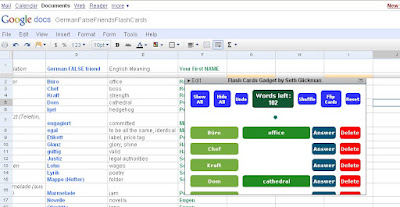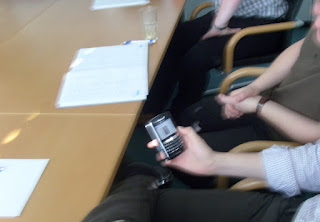
Scenario:
You've just done a really weighty, vocabulary rich text with your English language learners.
It was a great article from Business Spotlight or maybe something you downloaded from an online news source.
Perhaps it was a reading out of a textbook a little above their level (oops!) or you had them review sections from an authentic, bestselling, business book in their field.
You were so keen - it was exactly their interests, you sigh, yet it was just too much vocabulary.
Now you're all feeling a bit overwhelmed and they're looking at you like you are the meanest English teacher in the world.
So you buckled down and successfully explained the words, spent a chunk of class time dissecting the meanings, giving/getting examples with some of the students hitting their translators or looking in their dictionaries.
At the end of the lesson, you had them list the new words in their language journals.
Done. Ready to scurry on out of that failed lesson?
STOP.
There were at least 12 words they had never seen before. It might have been 20. *Blush*
Deep down you know there's a real good chance they may not know them next week either, let alone in a month's time.

Was it important vocabulary, I mean did you choose the article because it was stuff they expressed an interest in, it's topical and relevant to their lives?
So they
would benefit from knowing that great lexis. Right?
It's your task now to transfer some of those into their active vocabularies.
Instead of using a whole lesson dissecting words (or rather you teaching them the vocabulary) why not work on a few and put these into active use.
Here's one tip on how to do this:
1. What's important?
Not all of that lexis is stuff they're going to be able to use again. Get your students to individually decide which words are most relevant and encourage them to choose no more than 8 that they can see as being useful.
All the better if they can choose whole phrases, i.e.
a prudent investment is stickier than "
prudent."
2. Let's share what was so hard
Get one of the students to go up to the board eliciting words and phrases that the rest of the class want to learn. Encourage students to share at least 4 - add numbers when you hear a word or phrase repeated.
At the end of this, draw a circle around these highest ranking words.
3. Why those words?
Look at the highest ranking words and phrases. Ask students why they chose these, getting them to repeat them as they explain their reasons.
4. What's the situation?
Ask your students to brainstorm circumstances when these phrases might be used in a conversation.
Would it be on the telephone? In a meeting? A meeting about what?
At a business dinner? Throw out some ideas and get them to tell you others.
5. Who's using those words?
Tell them they're eavesdropping on a conversation. It's awfully interesting. Who's speaking?
 6. What are they saying?
6. What are they saying?
Divide your students into groups and tell them to write out a dialogue. Get volunteers from each group to become the secretaries.
7. The screenwriting event.
The secretaries'
post-task activity is to type up the mini-screenplays and bring in copies for the rest of the class.
The rest of the students should either
a) look for examples of these words in context on google (
see here) or
b) use at least two words/phrases during the week with their colleagues or clients and report back with the who and how in the next lesson.
You know what's coming next, right?
8. The Oscars
In the next class, check and edit the screenplays. Encourage students to mix into different groups to read and review each others dialogues. Ask for volunteers to do one as a quick play.
Ask some of the students if and how they used the words they chose during the week or if they read them anywhere else.
Over the coming lessons, throughout the following weeks, you now have two different
here's-one-I-made-earlier ice-breakers/ warmers /fillers at hand and can get different students acting out the various dialogues or discussing how students have managed to use the vocabulary.
They love that part, especially if they inject the words into a later conversation and you notice.

As always, hope this works for you as well as it does for me!
You can apply these steps to any lesson which involves teaching a lot of lexis in one go.
Before you dash off though, do you have another tip or suggestion for us on making vocabulary sticky?
Share your ideas by clicking comments and thanks very much!
Useful links related to this posting:
What to do with emergent language
Beam their errors on to the wall
Finding articles in your students fields
Noticing the News
Reading turned into speaking
Best,
Karenne




































